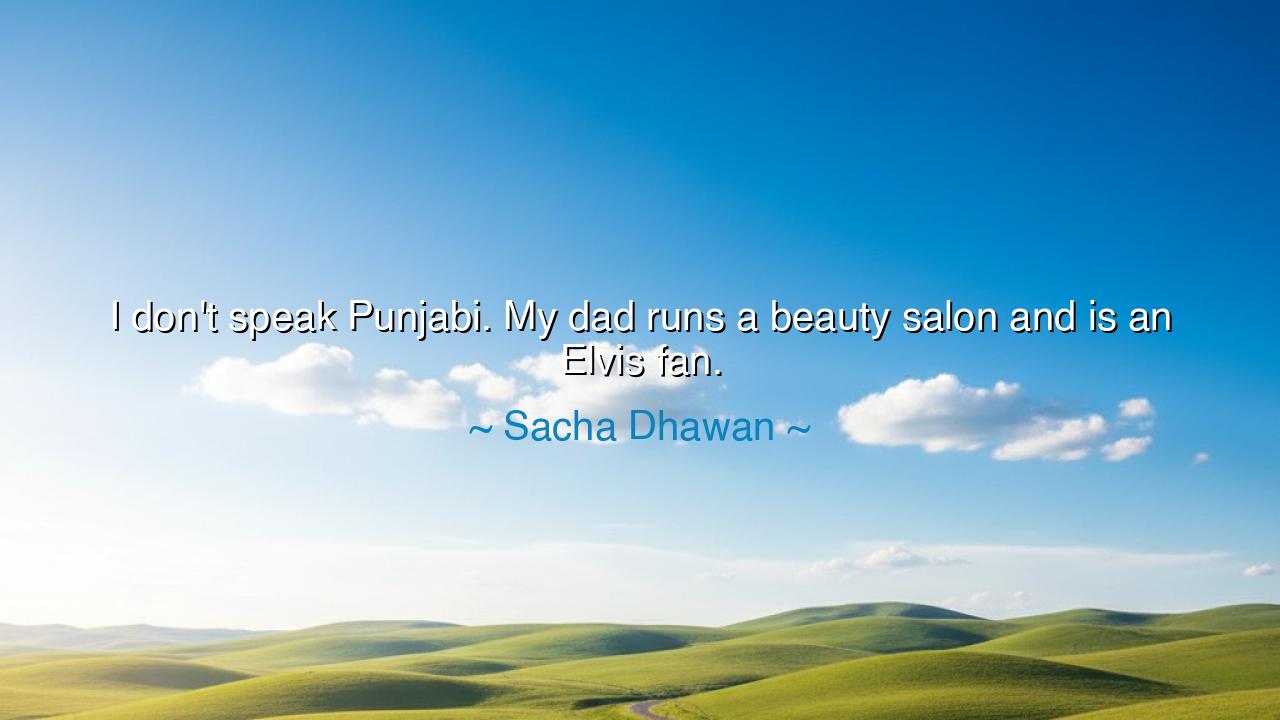
I don't speak Punjabi. My dad runs a beauty salon and is an Elvis






The words “I don’t speak Punjabi. My dad runs a beauty salon and is an Elvis fan” were spoken by Sacha Dhawan, a British actor whose roots trace back to the heart of India, yet whose life blossomed in the soil of another land. At first, these words may seem light, even casual — a simple statement about heritage and family. Yet beneath them lies a truth both ancient and profound: the tension between identity and inheritance, between the world we are born from and the world we are born into. It is a truth that echoes in every generation that crosses oceans, seeking to balance the weight of the past with the winds of the present.
To say “I don’t speak Punjabi” is not merely to admit the loss of a language; it is to speak of the quiet ache of distance — the kind that forms when one’s ancestral tongue fades, replaced by the cadence of another culture. In these few words lies the story of countless souls scattered by migration, the children of those who left their homeland in search of better lives. They inherit not fields or palaces, but a fragmented identity, a patchwork of belonging. Their hearts are divided — one part rooted in ancient soil, the other reaching toward new skies. They are neither entirely of one world nor the other, and yet, somehow, they belong to both.
Dhawan’s words also honor the humility and courage of his father, who runs a beauty salon — a place not of grandeur, but of service. This, too, is a story as old as civilization: the story of parents who labor in silence so that their children may walk in light. The beauty salon becomes a symbol — not just of livelihood, but of transformation, of hands that work to create confidence and grace in others, even when life has given them little rest. And his father’s love for Elvis, that American icon of rebellion and song, reveals another layer — how culture travels, how it intertwines, how one man from Punjab might find joy and freedom in the rhythm of a foreign melody. It is the union of East and West, the living tapestry of human adaptation.
In the ancient world, such stories would have been sung by bards who celebrated the wanderer’s heart. Consider Aeneas, the hero of Troy, who fled the ashes of his homeland to found Rome. He carried his father upon his back — both literally and symbolically — across the seas. Like Dhawan’s father, he bore the weight of legacy so that the next generation might build anew. Aeneas did not forget his lineage, but he did not live in its shadow either. He transformed it. So too does Dhawan’s quote remind us that identity is not a fixed monument, but a river — ever flowing, ever reshaped by the lands it passes through.
There is a quiet heroism in such stories — not the heroism of battle or conquest, but the heroism of becoming. It takes strength to hold two cultures in one heart without letting either one consume the other. It takes wisdom to love one’s heritage without being imprisoned by it. And it takes tenderness to honor one’s parents for who they are — not for what the world expects them to be. Dhawan’s father, in his salon, with Elvis songs playing and scissors in hand, becomes a poet of survival — shaping beauty in small, daily acts of devotion.
The deeper meaning of Dhawan’s words lies in acceptance — the acceptance that identity need not be pure to be true. The child who no longer speaks his ancestral tongue still carries its rhythm in his soul. The father who dances to another man’s song is not betraying his roots but enriching them. For what is culture if not the weaving of human experiences across time and place? To live between worlds is not to be lost — it is to be expanded, to contain multitudes, as the poet once said.
The lesson, then, is both simple and profound: embrace the mosaic of your being. Do not lament the pieces that differ, but see how they form your unique pattern. Honor your heritage not by imitation, but by transformation. Speak the language of your ancestors if you can — but if you cannot, speak their values instead: their resilience, their work, their love. Like Sacha Dhawan’s father, carry the rhythm of your people in your hands, even if your voice sings in another tongue.
For the ancients would remind us — the essence of who you are is not found in the language you speak or the music you love, but in the spirit you keep alive. And so, whether your father trims hair beneath an Elvis tune or your mother weaves dreams in a foreign land, know this: you are the bridge between worlds, the living proof that humanity’s strength lies not in sameness, but in its endless power to blend, to endure, and to create anew.






AAdministratorAdministrator
Welcome, honored guests. Please leave a comment, we will respond soon